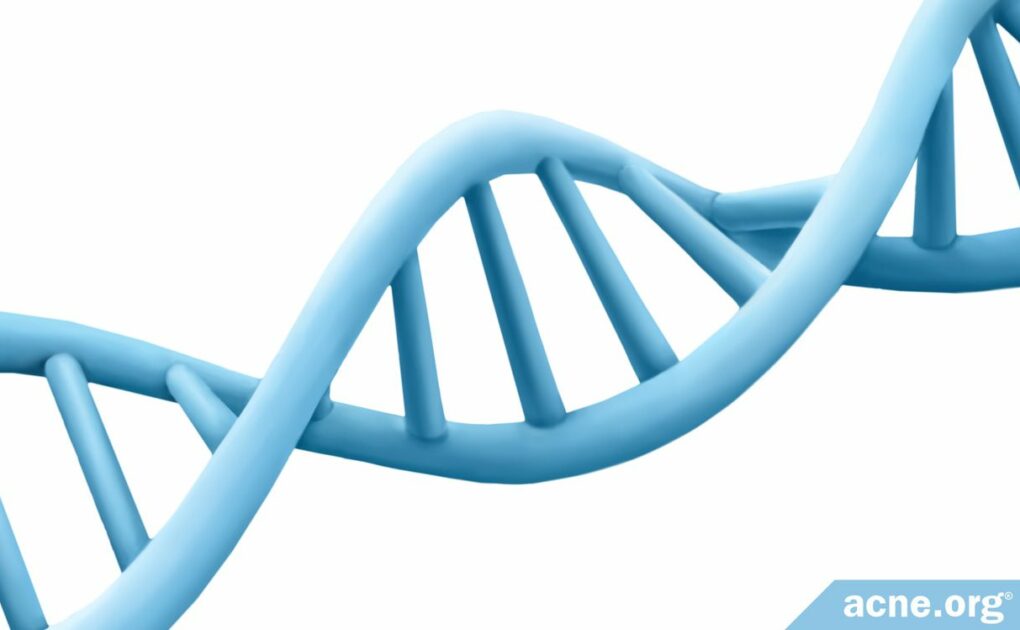Numerous Genes May Increase the Likelihood of Developing Acne

The Essential Info
Acne is in part a genetic disease. If your parents had acne, there is a greater likelihood that you will as well.
However, due to the complex nature of acne, it is unlikely that there is a single acne gene that triggers acne formation. Instead, it is more likely that multiple genes work together to predispose someone to acne.
The genes that may contribute to acne help control:
- The body’s immune system
- Hormone production
However, since there are other factors that also lead to acne, it is likely that there are more acne-related genes that have yet to be identified.
The sobering truth is that we still don’t have a firm grasp on exactly how genetics affects acne. More research is needed to identify various acne-related genes, and to understand how these genes may be targeted for better acne treatments. However, even if the mystery regarding which genes are involved in acne gets solved, a genetic treatment for acne is still only a distant hope.

The Science
- Genetic Predisposition
- The Science: A Look at the Studies Identifying Genes That May Increase the Genetic Predisposition for Acne
Acne is a complex skin disease that develops due to several factors, including inflammation, abnormal skin cell growth, an overproduction of skin oil, and an overgrowth of bacteria inside clogged pores, all of which lead to the development of an acne lesion.
Each of the factors that lead to acne is controlled by one or more genes. A gene is a DNA molecule inside the nucleus of our body’s cells that contains the information the body uses to make proteins that have specific functions in the body. Humans have between 20,000 and 25,000 genes in each cell.
Often, multiple genes can work together to provide information as a team. When it comes to acne, to date researchers have not been able to identify a single gene that is at fault. Instead, it is likely that several genes are at play in the numerous processes that lead to acne, and researchers are currently tracking down clues.1,2
Genetic Predisposition
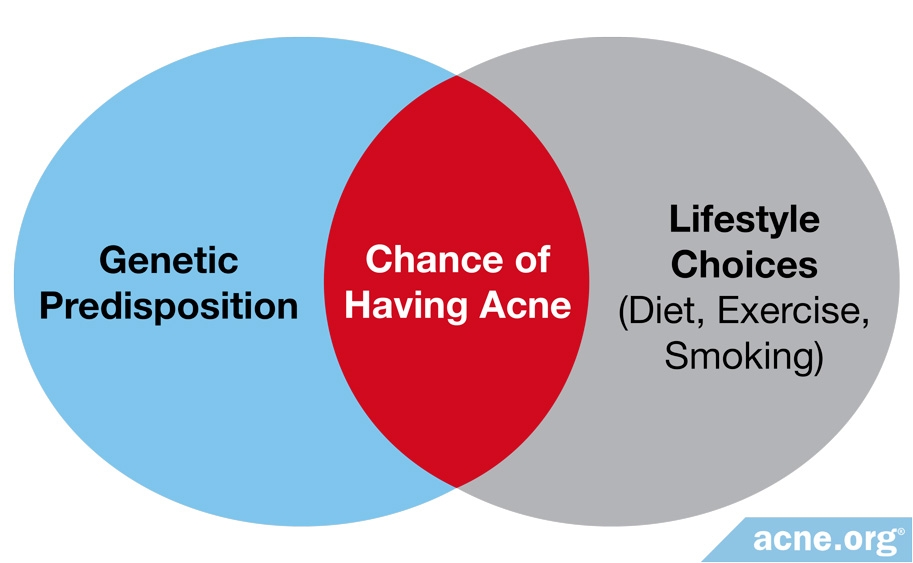
In order to understand the research investigating which genes may lead to an increased susceptibility of acne, it’s important to grasp the concept of genetic predisposition. Genetic predisposition is an increased probability of developing a disease due to the genes you inherited from a parent. A genetic predisposition for acne means that a person has a genetic make-up that may increase the chance of that person developing acne during his or her life.
However, if a person has a genetic predisposition for acne it does not mean that they will definitely develop acne. This is because the manifestation of genes is often controlled through lifestyle choices, like diet, exercise, or smoking. For example, if two people have the same genetic predisposition for acne but widely different lifestyles, one may develop more severe acne than the other, or one may develop acne and the other may not.2
The Science: A Look at the Studies Identifying Genes That May Increase the Genetic Predisposition for Acne
Ok, let’s start delving deeply now.
Scientists use five approaches to identify genes that may increase the likelihood of developing acne. All of these approaches work by comparing the genetics of groups of people with acne to the genetics of groups of people without acne. These five approaches include:
- Family heritability studies
- Twin studies
- Large population studies
- Genetic studies
- Researching genetic syndromes associated with acne
In these studies, scientists are looking at mutations in genes. A mutation is any change in a gene. When it comes to acne, the researchers are looking for mutations in the DNA of genes between those with and without acne. As acne is a complex disease involving numerous factors, a mutation in a single gene is thought to only have a small effect on the likelihood that a person will develop acne. However, mutations in several genes may significantly increase the genetic predisposition to acne.2
Family heritability studies

This is an early type of study, beginning at the start of the 20th century, that first gave us a glimpse at the fact that acne is a genetic disease. These studies looked at multiple generations of a family to see if acne is passed down from generation to generation, and were performed by asking multiple generations of a family to fill out a questionnaire with questions regarding their acne symptoms. Then, if multiple people within a family had similar acne symptoms, the researchers would conclude that the disease could be inherited from parents. It turns out there was a strong correlation.
Interestingly, the researchers concluded that people with acne tended to physically resemble ancestors that also had acne compared to their ancestors without acne. In fact, one researcher claimed that he was able to predict whether a child would develop acne based on how closely a child resembled another relative with acne. Although this claim is likely overstated, these early studies were important in identifying that genetics may impact acne.3
Twin studies
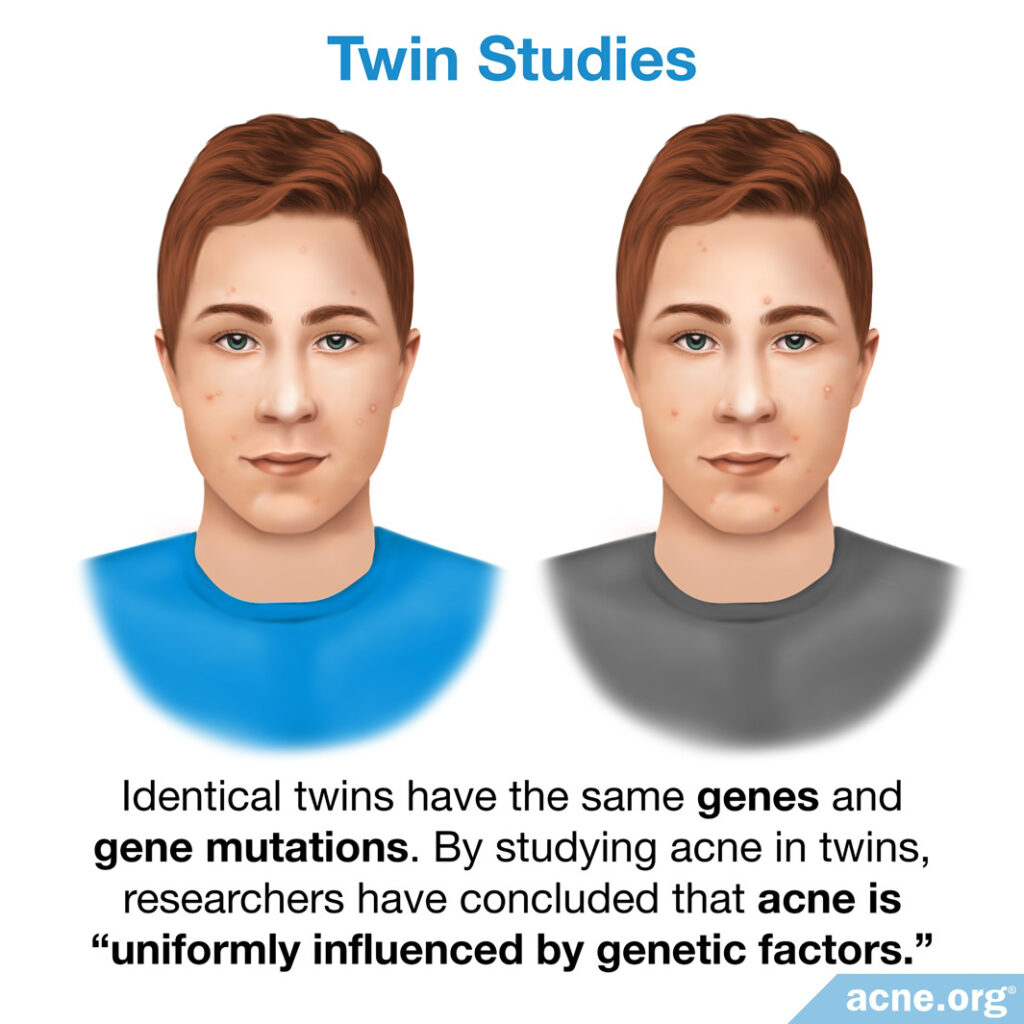
In 1984, scientists began using twin studies to research genetics and acne. Twin studies using identical twins are especially useful at identifying the impact of genes and lifestyle on acne because identical twins are genetically identical. This means that an identical twin has the same genes and gene mutations as their twin. Therefore, if both twins have acne it is likely due to a genetic predisposition found in both twins, but if only one twin has acne, then it is likely due to a lifestyle difference between the twins.
Researchers have performed three twin studies to research genetics and acne and have concluded that acne is “uniformly influenced by genetic factors.”3 In other words, acne is genetic.
- The first twin study compared the presence of acne in 930 twin pairs. The researchers found that identical twins had similar levels of acne, skin oil excretion, and acne severity. Therefore, the researchers concluded that genetics play a key role in acne.4
- The second twin study compared the presence of acne in 458 pairs of identical twins. The researchers found that acne was present in both individuals of an identical twin pair 81% of the time. This led the researchers to conclude that “acne is one of the most heritable skin phenotypes”, meaning that a predisposition to acne is likely inherited.4
- The third twin study compared the severity of acne in 1,906 twin pairs. It should be noted that in this study, about 40% of the twins were identical, while the others were non-identical or so-called dizygotic twins. Dizygotic twins are only as similar genetically as any pair of siblings who are not twins. The researchers found a high degree of similarity in acne symptoms among twins, suggesting that genetics play an important role not just in the presence of acne but in its severity.5
Large population studies
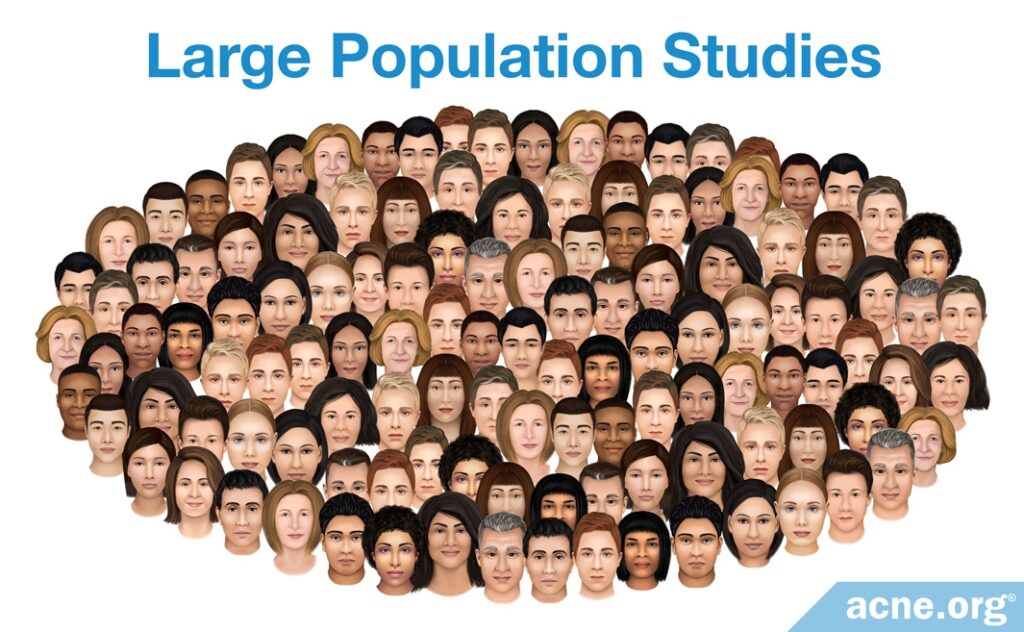
Researchers have performed several studies examining the differences between large groups of people with and without acne. Specifically, acne affects 80 – 90% of the population in Western countries, while acne tends to be much lower or even nonexistent in isolated hunter/gatherer populations.
This research has found that acne is a disease that begins between ages 10-12, and gradually increases until ages 16-18. In most cases, it resolves itself usually by the early 20s. However, acne persists into the adult years in some individuals, and these individuals often have a strong family history of acne, and therefore likely a genetic predisposition for the disease.3
Genetic studies

Genetic studies are performed by looking at individual genes to identify and characterize which mutations lead to an increase of a disease.
Researchers have been able to identify multiple genes that may increase a person’s genetic predisposition to acne. Ten of the most likely suspects are listed in the table below (Table 1).
Most of these genes produce proteins that are involved with the immune system’s response to acne and hormone production. As inflammation and hormones are two of the main drivers of acne development, scientists were not surprised that genes for the immune system and hormones were the ones linked to a genetic predisposition for acne. However, since acne is a complex disease it is likely that there are more genes involved with acne that scientists have yet to identify.3,6,7
A recent study identified 29 potential new genes of interest that may predispose a person to acne. Several of these new suspects are genes that regulate the formation and ongoing health of skin pores and skin oil glands, which makes sense because acne develops when skin pores become clogged with skin oil.8 Scientists believe that future research will reveal additional genes involved in skin oil production, formation of acne scars, and even in how well a person’s body responds to acne medication.9,10
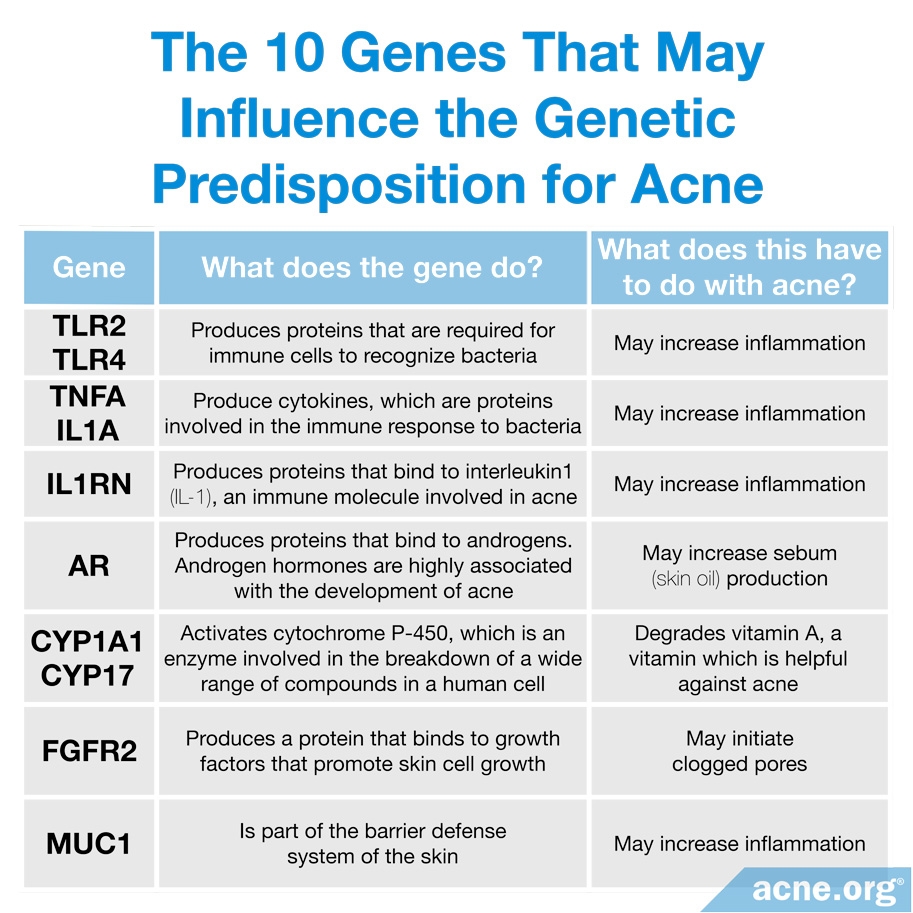
Researching genetic syndromes associated with acne
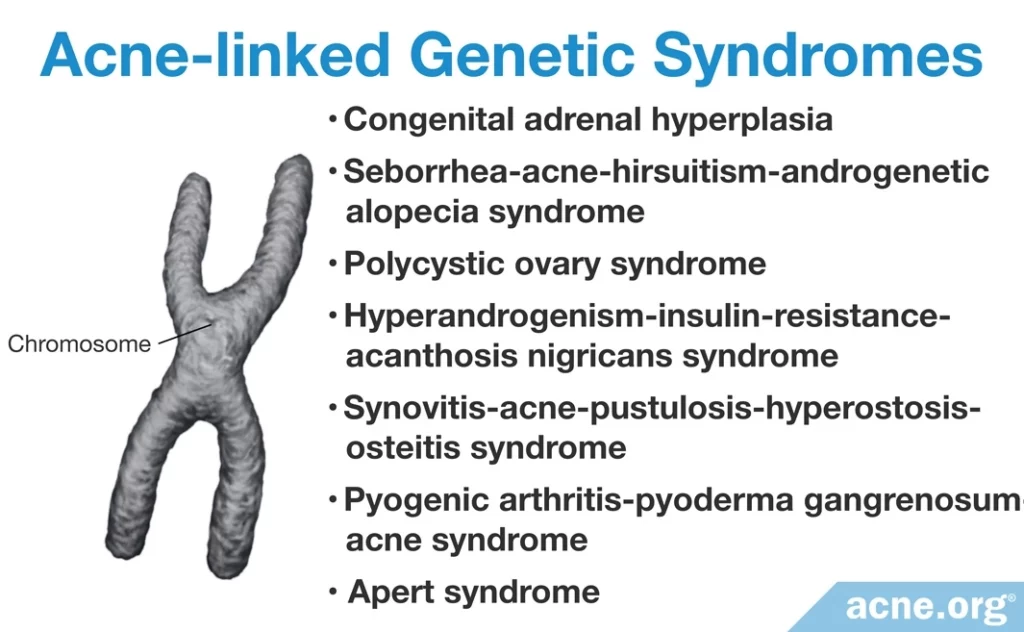
There are several diseases that are associated with an increased risk of developing acne. Researchers believe that it is likely that the genetic mutation(s) that cause these diseases also lead to the development of acne. These disorders include:
- Congenital adrenal hyperplasia
- Seborrhea-acne-hirsuitism-androgenetic alopecia syndrome
- Polycystic ovary syndrome
- Hyperandrogenism-insulin-resistance-acanthosis nigricans syndrome
- Synovitis-acne-pustulosis-hyperostosis-oesteitis syndrome
- Pyogenic arthritis-pyoderma gangrenosum-acne syndrome
- Apert syndrome
For example, polycystic ovary syndrome (PCOS) leads to increased male hormone levels in females and this also causes an increase in the number of acne lesions. Therefore, scientists are beginning to study these diseases to identify genes that may also trigger the development of acne.11
